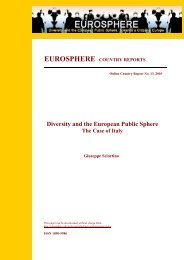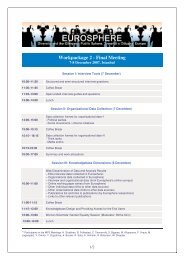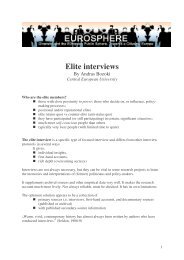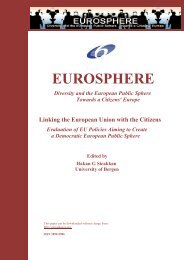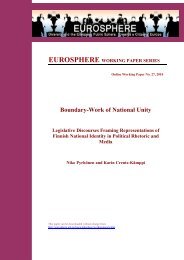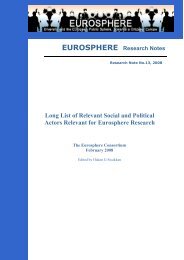Migrants, Minorities, Belongings and Citizenship. Glocalization and ...
Migrants, Minorities, Belongings and Citizenship. Glocalization and ...
Migrants, Minorities, Belongings and Citizenship. Glocalization and ...
Create successful ePaper yourself
Turn your PDF publications into a flip-book with our unique Google optimized e-Paper software.
It seems that a lot of the explanation why people engage in activities at<br />
BIKS is the diverse environment there. Some of the Norwegians<br />
originally just dropped in by chance or simply because they heard of an<br />
interesting activity taking place there. Some started being in<br />
multicultural environments in connection with their meeting a (potential)<br />
partner. Those who have children see the activities at BIKS as providing<br />
an opportunity for their children to get to know <strong>and</strong> experience aspects<br />
of different cultures while still young. Those with an immigrant<br />
background, on the other h<strong>and</strong>, have a motivation of either meeting<br />
“their own” (that is, people who speak their language or have a similar<br />
ethnicity) or connected with more political activities. They also use the<br />
place as a place for commemorations, cultural festivals <strong>and</strong> other<br />
national or group-related activities in addition. Once people have started<br />
to attend BIKS, they have become more active in the kind of activities<br />
<strong>and</strong> organisations which take place there. (Melve 2004:59)<br />
Considering primarily the Finnish <strong>and</strong> Norwegian fieldwork sites, what we call a glocal<br />
space also embraces people with essentialized belongings as well as people who derive<br />
their belongings primarily from the national or non-governmental spaces of interaction –<br />
such as NGOs, transnational/multicultural/intercultural organizations, etc.<br />
The Hungarian report classifies respondents’ motives for participation in the glocal sites<br />
into three categories: professional, friendship/curiosity, <strong>and</strong> social/political motives.<br />
[Concerning the first category], these respondents usually must go to<br />
the glocal space because it is their regular workplace in some ways. But<br />
it is not an obligation only: it is a conscious choice for them to work in<br />
an international, glocal environment <strong>and</strong> they like it. […] [Regarding the<br />
second category], these respondents are playing more than one role in<br />
glocal spaces, or they attach themselves to more than one glocal site.<br />
They have emotional, family ties, as well, beyond ‘curiosity’ <strong>and</strong><br />
profession. […] Respondents in this category [the third category] are<br />
tempted to do something for the community (local or virtual) to help the<br />
people. They are involved in neighborhood, solidarity, <strong>and</strong> other civil<br />
society activism which are driven by social values. (Bozóki <strong>and</strong> Bösze<br />
2004:138-140)<br />
What is significant in almost all cases is that most of those who attend to glocal spaces –<br />
both the majority citizens <strong>and</strong> others with minority backgrounds – emphasize their need<br />
61



